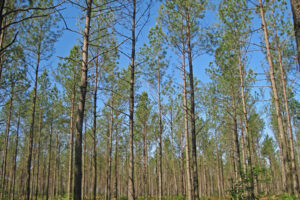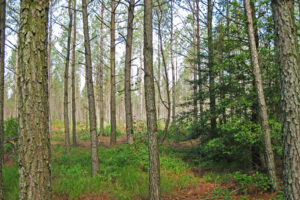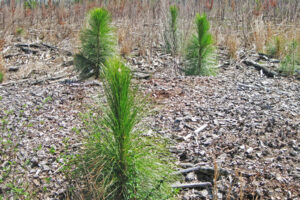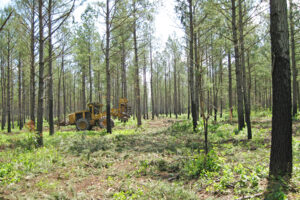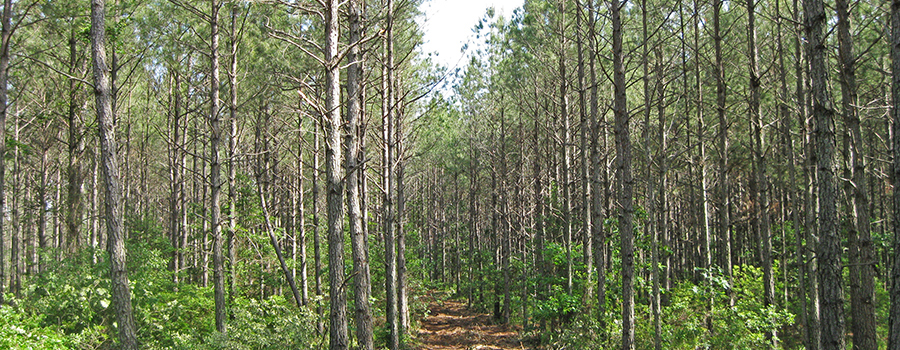
Overview
The 2,403-acre Big Woods State Forest is located in Sussex County. Management of the Big Woods State Forest focuses on development of diverse timber stands that support biological diversity, demonstration of scientific forest management, applied forest research, development of diverse wildlife habitat, watershed protection, and passive outdoor recreation activities.
Approximately 4.8 miles of perennial streams, 3.1 miles of intermittent streams and 1.5 miles of ephemeral streams exist on the property. Much of the headwaters for the Seacorrie Swamp can be found on the Virginia Department of Forestry (VDOF) and adjacent Department of Wildlife Resources (DWR) properties (Big Woods Wildlife Management Area and Big Woods Parker’s Branch Tract WMA). These waters drain to the Nottoway River, part of the larger Chowan River Basin.
The northernmost breeding population of endangered red-cockaded woodpeckers (RCW) is found on The Nature Conservancy’s (TNC) Piney Grove Preserve, immediately north of the state forest. Under TNC’s active management of pine savanna habitat, the Piney Grove RCW population continues to increase.
At a Glance
Access Status: Open to the Public
Hours: Open daily from dawn until dusk
Physical Address:
Latitude/Longitude:
36° 56’ 3.0”, -77° 4’ 21.0”
Parking/Access: The forest is accessible from Beaverdam Road and Cedar Sign Post Road. There are no large parking areas available. Parking is allowed near the gates of forest roads as long as the roads are not blocked.
Restroom Facilities: None
Visitors are asked to adopt a “leave-no-trace” ethic when visiting the forest, as there are no restrooms or trash cans on the forest itself.
Other Facilities: None
VDOF recommends that all forest visitors wear blaze orange or pink during hunting seasons.
In 2008, the Virginia General Assembly approved a bond through the Virginia Public Building Authority that enabled the Commonwealth to acquire and/or have conservation easements placed upon large tracts of important conservation lands at key sites across the state. This was commonly known as the “Conservation Bond.” Using these funds in 2010, the Virginia Department of Forestry purchased 2,202 acres from The Nature Conservancy to create the Big Woods State Forest.
As part of the same land transaction that created the Big Woods State Forest, the Virginia Department of Wildlife Resources purchased approximately 2,208 acres to create the Big Woods Wildlife Management Area. Both of these tracts lie immediately south of The Nature Conservancy’s 3,179-acre Piney Grove Preserve. This makes for a continuous block of forest, about 7,587 acres in size, that is protected from development and will be managed for a variety of forest resources in perpetuity.
All of this property had been owned and managed for wood fiber by Union Camp Corporation since the 1930s. In 1993, Hancock Timber Resource Group acquired the property, then sold it to the Nature Conservancy in 1998. The management emphasis has historically been strongly focused on pine pulpwood production.
The Big Woods State Forest is managed to be biologically and economically sustainable. Like all state forests, Big Woods is certified to Sustainable Forestry Initiative (SFI) and American Tree Farm System standards. Initial timber sales have focused on pine thinnings and harvesting timber that is in the poorest condition with the least potential for growth. Forest types typically associated with the coastal plain of Virginia will be maintained.
Loblolly and longleaf pine plantations cover 88% of the forest. The other 12% is classified as non-commercial forestland – this includes bottomland hardwoods (found mostly in the floodplains along riparian buffers), scrub wetlands, and road right-of-ways.
Rare and Endangered Species
The federally endangered red-cockaded woodpecker is found on the adjacent TNC property and has the potential to move into the state forest as the pines age. Although no endangered species have been documented on the forest itself, wetlands, streams, and historically undisturbed sites offer the highest chance of harboring rare species.
Recreational uses of the Big Woods State Forest include hunting, hiking, horseback riding, and wildlife watching.
Visitors are asked to adopt a “leave-no-trace” ethic when visiting the forest, as there are no restrooms or trash cans on the forest itself.
ATV/ORV use, camping, and swimming are prohibited on all State Forests.
A State Forest Use Permit* is required for individuals aged 16 and older to hunt, fish, trap, horseback ride, or mountain bike on state forest lands. The permit can be purchased online at or where hunting licenses are sold.
Visitors are asked to adopt a “leave-no-trace” ethic when visiting the forest, as there are no restrooms or trash cans on the forest itself.
ATV/ORV use, camping, and swimming are prohibited on all State Forests.
A State Forest Use Permit* is required for individuals aged 16 and older to hunt, fish, trap, horseback ride, or mountain bike on state forest lands. The permit can be purchased online or where hunting licenses are sold.
Trails and Roads
- 4.2 miles of forest roads (vehicles allowed)
- 8.2 miles of gated forest roads (no vehicles)
- No driving past forest gates.
Hiking
Hiking is permitted on forest roads.
Mountain Biking
Biking is permitted on forest roads.
Horseback Riding
Horseback riding is permitted on forest roads.
State law requires that visitors carry a copy of a negative Coggins test report with each horse on state lands.
Fishing and Boating
None
Hunting and Trapping
Hunting and trapping are permitted with a valid State Forest Use Permit and valid hunting license in accordance with state regulations and Sussex County firearms regulations.
Note that some regulations may be different than on private land, so check Virginia Department of Wildlife Resources Hunting Regulations for specific state forest details.
View additional hunting resources below under Maps and Additional Resources.
Other Recreational Opportunities
Other passive recreational opportunities, such as wildlife watching and nature photography, are available.
Airfield Conference Center/Southeast 4-H Educational Center is located approximately 5 miles to the east.
- Self-learning opportunities are available.
For more information or questions, e-mail us or use our contact form.
State Forest Main Office
Located at Cumberland State Forest
751 Oak Hill Road, Cumberland, VA 23040-2511
E-mail | (804) 492-4121
Local Contact
Dennis Gaston, Forester
11301 Pocahontas Trail, Providence Forge, VA 23140
Email | (804) 966-2201

